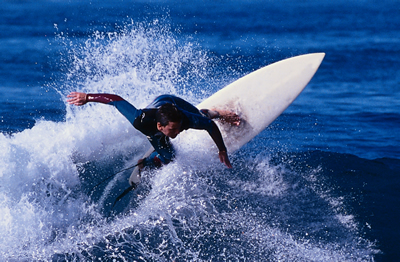OFF-SEASON BLUES
Jarrett Pflieger
You just finished your last race of the season and set a new personal record for that course. Once your accomplishment sinks in, it’s quickly replaced by a feeling of emptiness. What do you do now that racing season is over? What could you possibly have to look forward to for the rest of the year? The answer… next season.
 Now is not the time to take four months off of training. Sure, go ahead and relax for a few weeks after a good season, but you should already be preparing for next year and keeping your current fitness levels from dropping too much. Your goal doesn’t necessarily need to be improving fitness, but your top priority should definitely be maintenance. Why waste all the hard work you did this past year? Stay on your game and come back solid next year. So how do you do this?
Now is not the time to take four months off of training. Sure, go ahead and relax for a few weeks after a good season, but you should already be preparing for next year and keeping your current fitness levels from dropping too much. Your goal doesn’t necessarily need to be improving fitness, but your top priority should definitely be maintenance. Why waste all the hard work you did this past year? Stay on your game and come back solid next year. So how do you do this?
Off-season tip #1: Don’t train like a maniac
Chances are, you were training like a maniac during the season and your body needs some active rest. If you were training at your full potential, it will be very difficult for your body to sustain very intense and long training cycles year in and year out.
Now is the time to give you body and mind a rest by taking it easy and trying something different. Maybe spend time with the family or call up some friends and relatives you haven’t spoken with during the last eight months of training. They would probably be excited to hear from you.
Off-season tip #2: Cross-train
If all you do is swim, bike, and run, you will have severely under-developed muscles that are not used during these activities. This can affect performance and lead to injury. Take this off-season to do other things you enjoy to activate forgotten muscles.
Go surfing, hiking, skiing, or play some football, soccer, hockey, etc. Definitely swim, bike, and run occasionally, but keep the intensity lower than maximum and keep it unstructured. Just go by feel, and if you are the type that feels the need to punish yourself every workout, maybe you need to structure off-season workouts to be less intense.
Off-season tip #3: Hit the gym
I can talk until I’m blue in the face about the benefits of resistance training to endurance athletes, but many still refuse to do it, mostly due to time constraints. Now it’s the off-season, your workouts are shorter, and it’s time to hit the weights.
Strength and resistance training is probably the single best thing you can do to increase power and prevent injury. Just start slow if you are new to resistance training, then increases sets, reps, weight, rest duration, etc. as you go. It would be best to find a training plan or get a personal trainer, but just doing it is better than not doing it at all. Just make sure you are using proper technique or you could hurt yourself.
Don’t feel like you need to fling around heavy weights and barbells to train for more power. Resistance bands, stability balls, medicine balls, and many bodyweight exercises can be nearly as beneficial and much less dangerous. All you really need is two to three days a week for 20 – 30 minutes. Try doing circuits with back-to-back workouts sans rest.
Off-season tip #4: Concentrate of form
Now is the time to correct problems you have with your technique. You workouts should be shorter and less intense, so now you can really focus on correcting flaws in your swim stroke, pedaling efficiency, or running form.
What’s the use in logging countless hours using poor form? Your body will just learn the bad technique and it will be harder to correct later. Use this off-season to improve technique in your weaknesses, which will allow you to go faster and use less energy. Have a coach look at your technique and maybe even get some video of yourself so you can see what you are doing wrong.
Off-season tip #5: Plan your race schedule
What’s the next best thing to racing and training? Planning your racing and training of course!
Do some research on which races you may want to do next year. You can begin to plan your training early to be prepared for those races based on the distance and the terrain of the race. Don’t decide you are going to try your first Ironman a month out from the race; you will not be able to be ready in time.
Hopefully some of these tips were helpful. It is very easy to get complacent and lose fitness over the off-season. Be the person that maintains or even improves before next season even starts. Now go out and have a social life for the next few months, it won’t last long.


